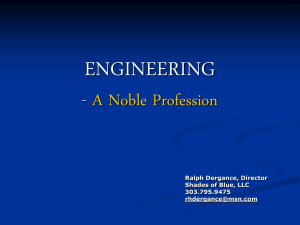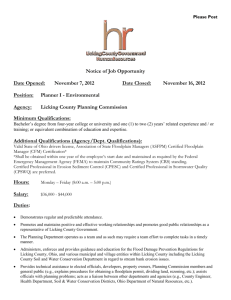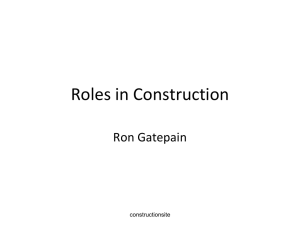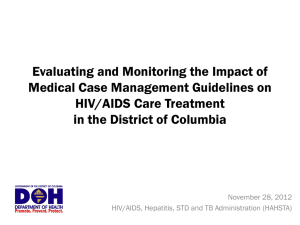Pollution Prevention/Good Housekeeping for
advertisement
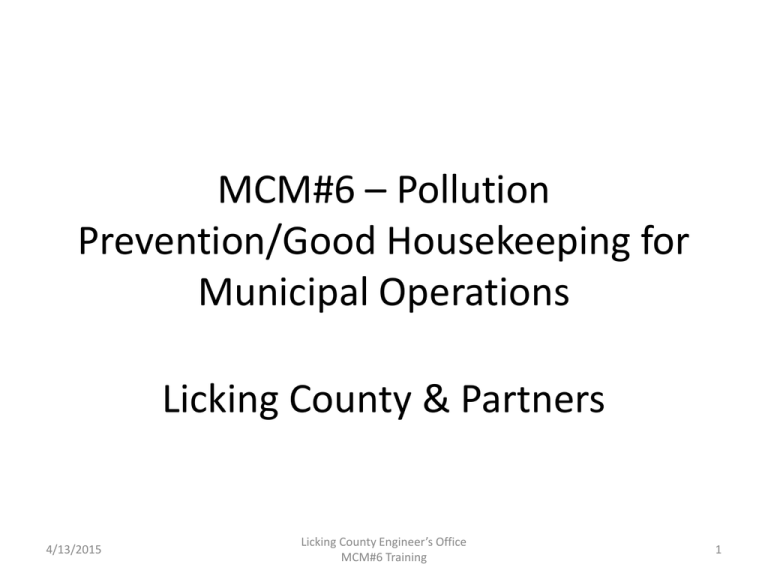
MCM#6 – Pollution Prevention/Good Housekeeping for Municipal Operations Licking County & Partners 4/13/2015 Licking County Engineer’s Office MCM#6 Training 1 Why are we here? • Licking County is an MS4 Community (since 2003) – MS4 = Municipal Separate Storm Sewer System • LC partners with 7 townships + 3 villages – SWMP – Storm Water Management Program • Six Minimum Control Measures: – – – – – – 4/13/2015 MCM1 - Public Education & Outreach MCM2 - Public Participation & Involvement MCM3 - Illicit Discharge Detection & Elimination MCM4 - Construction Site Runoff Control MCM5 - Post-Construction Storm Water Management MCM6 – Pollution Prevention/Good Housekeeping for Municipal Operations Licking County Engineer’s Office MCM#6 Training 2 MCM#6 Requirements • Develop & implement an O&M program – Includes training – Goal of preventing or reducing pollutant runoff from municipal operations • Include training to prevent or reduce pollution – – – – – 4/13/2015 Park & open space maintenance Fleet & building maintenance New construction & land disturbance Storm water system maintenance Municipal facility operations (= private requirements) Licking County Engineer’s Office MCM#6 Training 3 Training Required by the Permit • Annual Employee Training -- in order to eliminate or reduce storm water pollution. • Best Management Practices (BMPs): – – – – – Good Housekeeping & Spill Prevention Vehicle & Equipment Washing Vehicle & Equipment Maintenance Spill Reporting & Response Street Maintenance (including Storm Sewers & Ditches) – Outdoor Storage of Materials & Wastes – Landscaping & Lawn Care 4/13/2015 Licking County Engineer’s Office MCM#6 Training 4 Video: Storm Watch or Video: Storm Warnings (both available from LTAP) 4/13/2015 Licking County Engineer’s Office MCM#6 Training 5 BMPs shown in Video • • • • • • • Good Housekeeping Material Management Spill Response Equipment Fueling & Repair Outdoor Manufacturing Waste Management Dust Producing Processes 4/13/2015 Licking County Engineer’s Office MCM#6 Training 6 Discussion • Materials handled that might cause pollution: – Lubricants – Paints – Salt – Brine – Fuels – Solvents – Aggregates 4/13/2015 Licking County Engineer’s Office MCM#6 Training 7 • Spill Kits? • Dumpster kept closed? – Location – Contents • Vehicle washing • Activities Most Likely • General to have a spill: housekeeping? – Fueling – Oil changes – Winter deicing (salt & brine) 4/13/2015 – Good enough? Licking County Engineer’s Office MCM#6 Training 8 MCM#6 - Good Housekeeping • Keep work area neat and orderly – Don’t let scrap accumulate – Sweep up regularly – Clean up drips & spills promptly • Keep Unused containers tightly closed – Keep lids on containers unless using them – Make sure all containers are labeled correctly 4/13/2015 Licking County Engineer’s Office MCM#6 Training 9 Vehicle & Equipment Maintenance • Stay with vehicle during fueling • Move leaking equipment inside • Use drip pans when equipment cannot be moved indoors immediately • Perform vehicle maintenance inside 4/13/2015 Licking County Engineer’s Office MCM#6 Training 10 Vehicle & Equipment Washing • Wash vehicles at a commercial facility • Wash vehicles & equipment inside – Wash water must go to sanitary sewer • When commercial or inside facilities are not available – wash on an impervious area where all runoff goes to the sanitary sewer. – Wash area should be roofed and clean water kept off of wash pad. 4/13/2015 Licking County Engineer’s Office MCM#6 Training 11 Spill Reporting & Response • NEVER hose down a spill – That’s strictly prohibited! • Clean up spills quickly before they get away – Do a thorough job, leave no residue behind • Protect storm drains from spills – Place pigs or absorbents between spill & drain • Dispose of clean-up waste properly – Recycle or send to appropriate landfill facility 4/13/2015 Licking County Engineer’s Office MCM#6 Training 12 Street Maintenance • Debris from street sweeping and catch basin cleaning must go to a sanitary landfill. • Waste water leaching from this material must go to the sanitary sewer system. • Protect storm drain inlets during street maintenance. 4/13/2015 Licking County Engineer’s Office MCM#6 Training 13 Landscaping & Lawn Care • Obtain proper training and licensing prior to pesticide use. • Use pesticides according to label. • Use pesticides & fertilizers only as needed. • Leave a buffer next to open water (ponds & streams) as labeled. • Compost or otherwise properly dispose of clippings & yard waste. 4/13/2015 Licking County Engineer’s Office MCM#6 Training 14 Illicit Discharge Detection • Be alert to illicit discharges to the storm system – Discolored or inappropriate pipe discharges – Bad-smelling discharges – Potential for soil erosion to the storm system • Report illicit discharges so they may be remedied 4/13/2015 Licking County Engineer’s Office MCM#6 Training 15 Stormwater Pollution Prevention Plan (SWPPP) *Required for facilities within MS4 Urbanized Areas* 4/13/2015 Licking County Engineer’s Office MCM#6 Training 16 Stormwater Pollution Prevention Plan SWPPP 2.0 Pollution Prevention Team A Pollution Prevention Team has been assembled to manage stormwater at the Facility and minimize the potential for stormwater pollution. In addition to daily pollution prevention activities and implementation of the SWP3 which are undertaken by certain members of the Team, duties of the Pollution Prevention Team include: 4/13/2015 Assisting with the maintenance and updates and revisions of the SWP3 Conducting an annual comprehensive site-compliance evaluation to verify that the provisions of the SWP3 are met and that pollution prevention procedures and runoff controls are operating effectively. Responding to potentially significant spills or other incidents that could impact waters of the state. Name/Title Phone Responsibility Ernie Denman Superintendent (740)670-5350 Overall responsibility Mario Corsi Highway Safety Supervisor (740)670-5350 Sign Shop operations Don Wilson Mechanic Supervisor (740)670-5350 Mechanic Shop operations Kim Christian Administrative Assistant (740)670-5350 Annual Reports Steve Hicks Assistant Clerk (740)670-5350 Annual Reports Licking County Engineer’s Office MCM#6 Training 17 SWPPP 3.0 Description of Municipal Facility Operations Location Map, Site Map: 4/13/2015 Licking County Engineer’s Office MCM#6 Training 18 4.0 Potential Pollutant Sources • Chemicals/Materials – – – – – Brine Solution Fuel Oils Paint Road Salt • Exposed Materials – stored new/used • Waste Materials – used oils, trash 4/13/2015 Licking County Engineer’s Office MCM#6 Training 19 4.4 Summary of Potential Pollutant Sources 4/13/2015 Licking County Engineer’s Office MCM#6 Training 20 5.0 Stormwater Control Measures • Employee Training – Annually – All new personnel • Eliminate Illicit and Non-Stormwater Disch. • Spill Prevention, Control, & Cleanup – Spill Incident Report (Appendix A) 4/13/2015 Licking County Engineer’s Office MCM#6 Training 21 More • Outdoor Equipment Operations – Capture leaks • Outdoor Materials Storage – Liquid Tanks (secondary containment??) – Materials that will not wash away • Waste Handling & Disposal – Trash in dumpster (closed!) – Recycle oils, antifreeze, solvents, batteries 4/13/2015 Licking County Engineer’s Office MCM#6 Training 22 More • Vehicle & Equipment Washing – In designated areas (work needed) • Materials Receiving • Vehicle & Equip. Maintenance & Storage • Fueling Areas – Spill kit is available, small spills – absorbents – Stay at fueling point – Don’t top-off tanks. 4/13/2015 Licking County Engineer’s Office MCM#6 Training 23 6.0 Reporting/Record Keeping • • • • Annual Site Inspection Non-Storm Water Discharge Inspection Storm Water Discharge Visual Inspection Reporting Procedures – Inspection forms in Appendix A – Reports kept on file with this Plan 4/13/2015 Licking County Engineer’s Office MCM#6 Training 24
